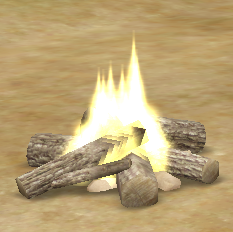The Wiki for Tale 4 is in read-only mode and is available for archival and reference purposes only. Please visit the current Tale 11 Wiki in the meantime.
If you have any issues with this Wiki, please post in #wiki-editing on Discord or contact Brad in-game.
Firepit
Warning: USING firepits cause Pollution
A firepit allows for the safe burning of wood with the help of flint and tinder to start the fire. The residue of a firepit is charcoal. Fish and vegetables can be grilled over the fire. Additionally, some items can be burned in a firepit to produce ash or lime.
Source
This building becomes available once you have learned the Controlled Burn tech. The Firebuilding skill is also required to light it.
Cost
- 40 Firebricks
- 80 Slate
Built Outside (Self > Projects).
Use
- Produce Charcoal from 200 Wood.
- Add up to 20 of each type of Fish and Vegetables, except Leeks, to grill them.
- Add up to 100 Leeks, 100 Dried Flax, and/or 100 Dried Papyrus to produce Ash.
- Add up to 100 Limestone to produce Lime.
- Need 1 Tinder and Flint to start the fire.
Once a fire has been lit, you have the option of stoking it if you have a Sharpened Stick or an Iron Poker. If you have both, it will let you choose which to use. Both seem to act identically other than that the poker does not seem to have a chance to burn up. Stoking a fire correctly keeps it burning longer, which increases its charcoal, ash, and lime yields. Stoking does not affect grilled food yields.
You can stoke the fire a tick or 2 after it starts , but only once , a second time will put it out. Fire goes in cycles from dim to bright ... orange -> yellow -> white -> yellow back to orange .. you stoke once on yellow BEFORE it turns white, and no more until it goes dim then bright again. The number of stokes will determine the output except in the case of vegetables or fish, where you always get the same number you put in.
Image showing the colours of the 3 fire cycles. If you look at the center of the fire with a color picking program it is trivial to know when a stoke phase occurs. The Hue of a fire will be 60 during the no-stoke phase, and then the Hue will drop to 0 for the stoke phase.
It looks like a sharpened stick will burn up if you stoke the fire while white , but only do this if you missed the yellow .. if you miss the yellow and hit it when white you can keep the fire going , if you miss both then try to stoke it on yellow ( the yellow after white ) you will put the fire out.
It is possible to leave the byproducts of firepit usage (charcoal, lime, ash) inside the firepit and still use it.
Other Tips
- When you first start, it is imporant not to panic-- the flames are going to seem to fluctuate between the stages. What you are looking for are the times when it holds the color-- long stretches of orange-- a solid few seconds of yellow-- the blinding white and so on.
- Wait for the Orange. You do your thing after orange-- and after staring at orange for so long-- the change to yellow/white is an obvious one and you can stoke.
- You'll know you did it right when the option to stoke dissapears-- then just wait for orange again.
- For record purposes, it helps to type the stoke number into main-- so you can keep track of how many stokes you've done-- and the approximate time spent.
Yield
The number of ingredients put in the firepit will determine the yield. The theoretical maximum yield seems to be 1/3rd of the ingredients put in for Ash and Lime. I.e for 100 Limestone the theoretical maximum is 33.3 Lime, and for 100 Dried Papyrus/Dried Flax/Leeks (300 total) the theoretical maximum is 100 Ash. For every additional stoke the return is less. I Have added some example outputs below (For full firepits - 100 limestone / 300 of ash ingredients ) --mosen 18:37, 19 January 2009 (EST)
| Stokes | Lime | Ash |
| 20 | 21 | 52 |
| 30 | 23 | n/a |
| 36 | 26 | n/a |
| 40 | n/a | 72 |
| 60 | 27 | n/a |
| 65 | n/a | 83 |
| Limestone/Papy | Limestone/Papy/Leeks | |||
|---|---|---|---|---|
| Minutes of Stoking |
Lime | Ash | Lime | Ash |
| 50 | 27 | 50 | 27 | 58 |
| 60 | 29 | 54 | 29 | 63 |
Firepit was stoked for the time listed and then allowed to die out. This results in about 5 minutes of additional burn time as the fire dies.
Akmenotep Fire Tests
100 Leeks, 100 Dried Flax
- 40 Stokes - 28 Ash, 44 Charcoal
100 Leeks, 100 Dried Flax, 100 Papyrus
- 40 Stokes - 70 Ash, 45 Charcoal
100 Limestone, 100 Leeks, 100 Dried Flax
- 9 Stokes - 21 Ash, 18 Lime, 33 Charcoal
- 19 Stokes - 23 Ash, 20 Lime, 37 Charcoal
- 33 Stokes - 26 Ash, 23 Lime, 42 Charcoal
- 36 Stokes - 28 Ash, 24 Lime, 45 Charcoal
- 40 Stokes - 28 Ash, 24 Lime, 44 Charcoal
- 50 Stokes - 29 Ash, 26 Lime, 47 Charcoal
100 Limestone, 100 Leeks, 100 Dried Flax, 100 Papyrus
- 33 Stokes - 65 Ash, 23 Lime, 43 Charcoal
- 40 Stokes - 70 Ash, 24 Lime, 45 Charcoal
- 50 Stokes - 76 Ash, 26 Lime, 48 Charcoal
- 60 Stokes - 80 Ash, 27 Lime, ? Charcoal
